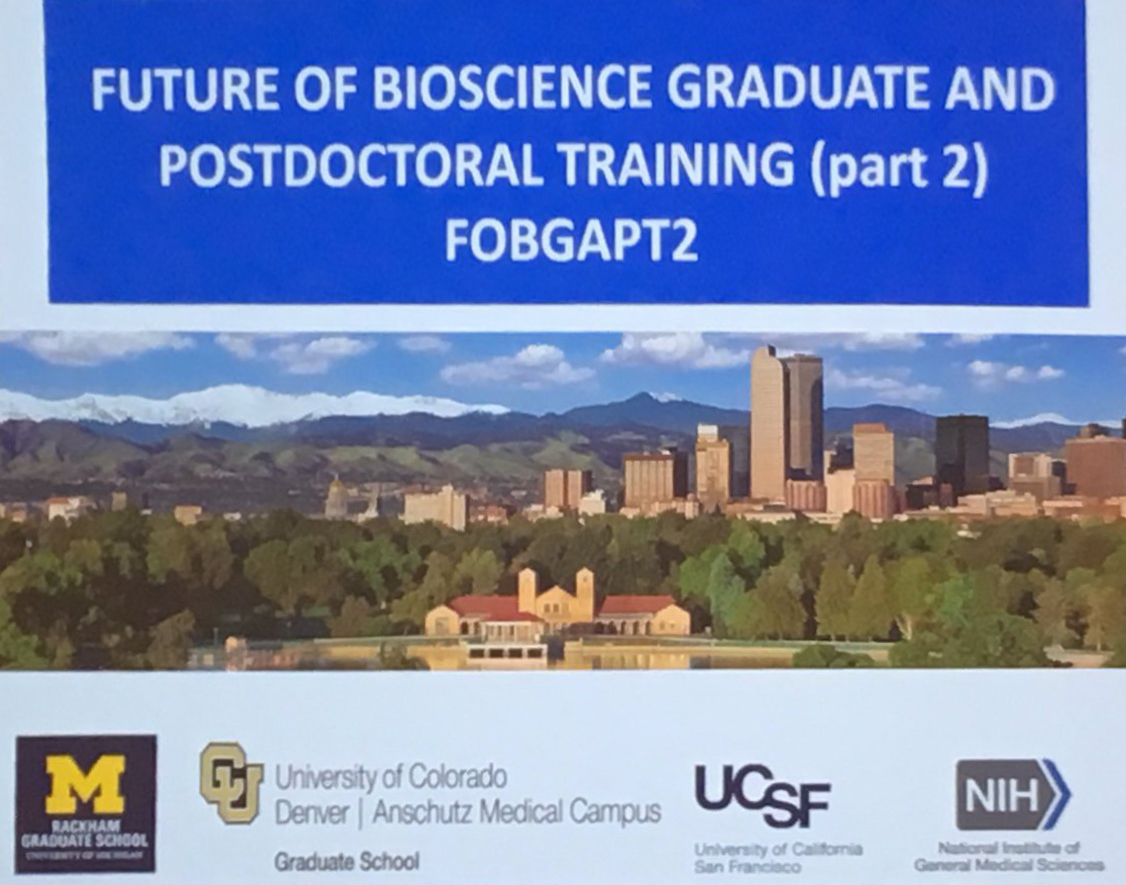By Christine Pfund, Nancy Schwartz and Richard McGee
 In 2015, the University of Michigan Rackham Graduate School hosted a national meeting entitled “Future of Bioscience Graduate and Postdoctoral Training”. This meeting brought together “a broad group of stakeholders, including representatives of academic institutions, funding agencies, trainees, scientific societies and other interested individuals, to discuss possible solutions to the career imbalances that have developed in the biomedical workforce” (www.rackham.umich.edu/fobgapt).
In 2015, the University of Michigan Rackham Graduate School hosted a national meeting entitled “Future of Bioscience Graduate and Postdoctoral Training”. This meeting brought together “a broad group of stakeholders, including representatives of academic institutions, funding agencies, trainees, scientific societies and other interested individuals, to discuss possible solutions to the career imbalances that have developed in the biomedical workforce” (www.rackham.umich.edu/fobgapt).
In June 2017, the University of Colorado Denver-Anschutz Medical Campus and the University of Michigan Rackham Graduate School co-hosted a second FOBGAPT meeting. The goal of this follow-up meeting was to share promising practices among the participants and develop a set of consensus recommendations for the biomedical science community, which would be disseminated through the conference website (https://gs.ucdenver.edu/fobgapt2/main.php) and a published white paper.
The conference kicked-off with three thought-provoking presentations:
- “Catalyzing the Modernization of Biomedical Graduate Education” by Dr. Alison Gamie, Director of the Division of Training, Workforce Development, and Diversity at the National Institute of General Medical Sciences
- “Supporting Career Diversity and Professional Development in Doctoral Education” by Dr. Julia Kent, Assistant Vice President at the Council of Graduate Schools
- “Economics and the Postdoctoral Position” by Dr. Paula Stephan, Professor of Economics at Georgia State University
All presentations are available on FOBGAPT2 website noted above.
Several NRMN leaders participated as workshop leaders at the conference. Rick McGee, Northwestern University and Chris Pfund, University of Wisconsin-Madison, in partnership with Jonathan Wiest from the National Cancer Institute, led sessions on “Increasing Engagement and Skills of Faculty in Mentorship”. This session was offered 6 times with each session moving towards consensus on main themes and concrete steps for achieving engagement and skills. The four themes chosen by participants for in-depth exploration were: 1) mentor training; 2) mentee training; 3) marketing the value of training; and 4) multiple mentors and mentoring networks. Key elements to focus on within each theme were identified to be included in the meeting report. Additionally, several overarching themes emerged including the need for more emphasis on self-actualization of mentees, and shared responsibility in mentoring relationships as denoted by the key themes of mentor AND mentee training.
Nancy Schwartz, University of Chicago, co-led a session with Jabbar Bennett (Northwestern), Nancy Street (UT Southwestern) and Christine Chow (Wayne State) on ways to better increase the diversity of scientists in senior and leadership roles. Review of the academic scientific workforce revealed crucial transition points along the pathway toward senior and leadership positions. The postdoc appointment was identified as a key stage at which experiences, resources and mentors could impact the trajectory of under-represented (women and minorities) scientists in beneficial or adverse ways. As well, many challenges in hiring, reviewing, recognizing and promoting underrepresented scientists continue as they develop their careers, even toward very senior positions. Numerous recommendations emerged through discussion and were prioritized by consensus.